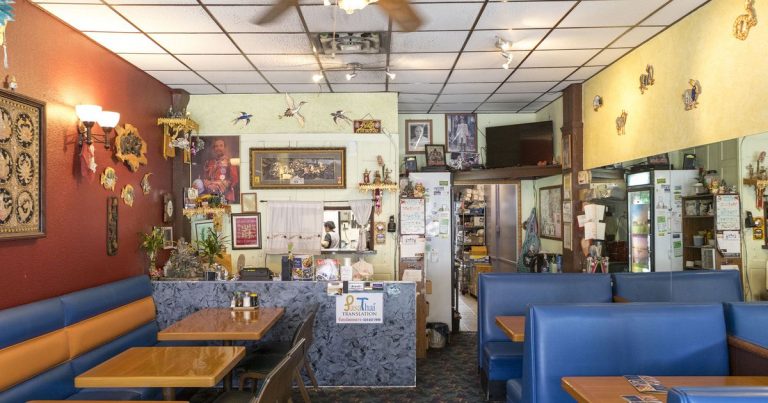What It’s Like to Be a Trans Person Working in a Restaurant Kitchen in Philly
In most restaurants, the stereotype is that men work in the back of the house and women work in the front of the house. The archetype of loud-mouth male chefs running the kitchen while polite, friendly women take orders and host is prevalent not only in movies and on TV but also in our preconceptions. But life doesn’t always imitate art. I am a cook. I’m also a masc-presenting AFAB (assigned female at birth) nonbinary person. My presence on the line is often confusing for some people and sometimes, myself.
As a trans person, my identity usually lives in a liminal space. I look and dress “butch,” but my body often doesn’t align with people’s expectations of my gender expression. I don’t identify as male or female, which can be confusing or frustrating for some. I often feel I straddle the line between being seen as a woman, which feels invalidating, or being seen as “one of the guys” which, while validating my gender, often opens me up to a whole host of other issues.
A dynamic that has played out in many places that I’ve worked is that some of my male coworkers find out that I’m queer and a trans-masculine person, so they accept me as part of the group. This validation of my gender expression is euphoric. The feeling of being accepted by my peers in the kitchen as a masculine person makes me feel like I belong. Unfortunately, this comes with its own issues: Being accepted into the clique means that I’m privy to the things that other people — especially the women at work — don’t usually hear. In being validated as a masculine person, I am exposed to the things men in kitchens say only to each other. I am, after all, one of the guys.
The assumption is often that because I’m queer, I must think of and interact with women the way that some of the more misogynistic and transphobic men do, regardless of the fact that being queer and masculine doesn’t make me automatically objectify or disrespect the women in my life the way that misogynists and transphobes do. Because of this assumption, I am subjected to their so-called locker room talk. Despite my standard “masculine” work outfit of stained Dickies, a backwards hat, and Doc Martens, I also still experience misogyny, sexual harassment, and gender-based discrimination in many facets of my life, like riding the trolley or going to the store, just like the women I work with. When speaking up, though, I instantly have that acceptance revoked and am treated like a woman again. When I object to sexist, homophobic, and transphobic comments, I often get told I’m too sensitive, and that’s just how guys in kitchens talk. Suck it up.
Once, while prepping before service at one of Center City’s most sought-after brunch spots, a group of my male coworkers was listening to a true crime podcast where the hosts were talking about a gay man being murdered. The hosts laughed and made fun of the man while one of the chefs chuckled and said, “serves him right, [homophobic slur].” I was horrified. Hearing someone I regularly worked with shoulder-to-shoulder casually toss around a slur about the victim of a hate crime, the same slur that has been hurled at me during some of the most difficult times of my life, cut deep. I no longer felt safe or comfortable around him, so I went to one of the female sous chefs and told her what had happened. She told me that, unfortunately, there was nothing she could do; he was her boss and one of the owner’s favorites so he had free rein.
This “that’s the way it’s always been” attitude holds the entire industry back.
After I moved on from there, I was working at a now-shuttered Center City restaurant. I walked in on a conversation of some of my male coworkers, including my male boss, rating the women that worked in the front of house, commenting on their physical appearance, and talking about what they would do to each woman in a way that made me feel sick. Stunned, I just stood there. It got quiet, and I thought they stopped because they saw me walk up only to realize they were indicating it was my turn to take part. I looked at this group of men I worked with every day, some of whom I deeply respected for their culinary skills, all staring back at me, waiting for me to weigh in on which server I wanted to sleep with most and why. I told them that I would absolutely not be contributing to this conversation and that the way they were acting was not at all an okay way to act ever, but especially at work. I was given the silent treatment for nearly three weeks. No one said a single word to me about anything but the special plate-up or the new cheeses for the cheese board. My punishment for speaking up was being isolated.
This type of behavior even caused me to quit one job, a position I had worked hard for because of the Rittenhouse Square’s restaurant’s reputation. My coworkers constantly used transphobic and homophobic slurs in regular conversation and it took a toll on me; it felt impossible to concentrate on work while each comment weighed on me. One day, upon walking into the prep room to grab some supplies for my station, the sous chef was saying some particularly disgusting and offensive things about a trans celebrity. I confronted him and asked him to stop, and all he said was, “Welcome to the back of house.” Later on, when I brought it up to the executive chef, he flatly told me he would ask the sous to “cool it.”
Nothing changed. Every day I had to show up to my job and hear a barrage of homophobic comments while no one around me batted an eye.
After a 10-hour day, the sous chef’s homophobic tirades only escalated, and the back-of-house staff continued to laugh along. That was the tipping point. I put my notice in. I had had enough. This, in part, has caused me to recently leave the industry. Maybe not forever, but certainly for now. The stress of kitchen work is manageable, but not with the weight of transphobia, homophobia, and misogyny crushing me every day.
Not every person who works in a professional kitchen acts like this, and it’s not always just men participating in this behavior. In those situations, if you witness this behavior, what do you do? Do you speak up? Smile awkwardly? Laugh along? This is often the way many people who experience misogyny and transphobia assess whether someone is trustworthy. Did that person speak up when transphobic comments were said around them?
Allowing this behavior to slide tells the perpetrators that it’s okay. Not saying anything, even if you don’t agree, is a tacit endorsement. And while it may be difficult or scary to speak up, especially if it feels like your job might be in danger, that is precisely what needs to happen in order to stop this cycle and make sure everyone feels safe at work. We all have the power to make our workplaces and social circles more equitable. We just have to be willing to confront the harmful behavior we see.






